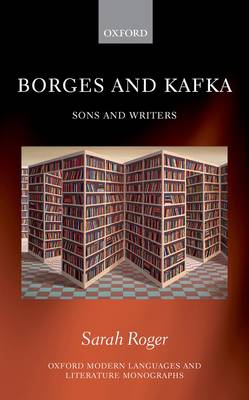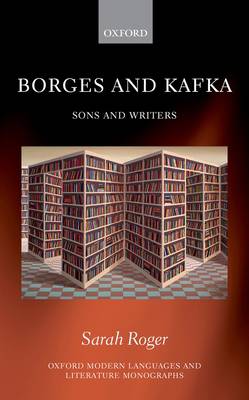
Bedankt voor het vertrouwen het afgelopen jaar! Om jou te bedanken bieden we GRATIS verzending (in België) aan op alles gedurende de hele maand januari.
- Afhalen na 1 uur in een winkel met voorraad
- In januari gratis thuislevering in België
- Ruim aanbod met 7 miljoen producten
Bedankt voor het vertrouwen het afgelopen jaar! Om jou te bedanken bieden we GRATIS verzending (in België) aan op alles gedurende de hele maand januari.
- Afhalen na 1 uur in een winkel met voorraad
- In januari gratis thuislevering in België
- Ruim aanbod met 7 miljoen producten
Zoeken
Omschrijving
Sarah Roger investigates Jorge Luis Borges's development as an author in light of Franz Kafka's influence, and in consideration of Borges's relationship with his father, Jorge Guillermo Borges (Borges père, a failed author). Borges believed that much of Kafka's writing derived from his personal experiences, particularly his relationship with his father. This book looks at how reading Kafka helped Borges mediate and make productive use of his own relationship with his father, and it offers a thorough analysis of Borges père's writing, which is supplemented by an appendix that reprints Borges père's poetry for the first time. Borges and Kafka also provides extensive analysis of Kafka's presence in Borges's critical writing, his translations, and the stories that he modelled on Kafka. Particular attention is paid to the concepts that Borges identified as Kafka's obsessions: subordination, infinity, and hierarchical relationships, which Borges referred to as the 'patria potestad.' Roger's analysis is accompanied by an annotated bibliography documenting every mention of Kafka in Borges's writing and a list of every Kafka text Borges read. Kafka's influence is especially evident in the stories where Borges was openly imitating Kafka-'La lotería en Babilonia' (1941), 'La biblioteca de Babel' (1941), and 'El Congreso' (1971)-but it features throughout Ficciones. Reading Borges's writing in light of his interest in Kafka demonstrates his focus not just on the individual's subordinate place in an infinite hierarchy but also on the repercussions these circumstances had for a struggling author like Borges, who was seeking to define himself through his writing.
Specificaties
Betrokkenen
- Auteur(s):
- Uitgeverij:
Inhoud
- Aantal bladzijden:
- 196
- Taal:
- Engels
- Reeks:
Eigenschappen
- Productcode (EAN):
- 9780198746157
- Verschijningsdatum:
- 6/03/2017
- Uitvoering:
- Hardcover
- Formaat:
- Genaaid
- Afmetingen:
- 137 mm x 218 mm
- Gewicht:
- 362 g

Alleen bij Standaard Boekhandel
+ 418 punten op je klantenkaart van Standaard Boekhandel
Beoordelingen
We publiceren alleen reviews die voldoen aan de voorwaarden voor reviews. Bekijk onze voorwaarden voor reviews.









